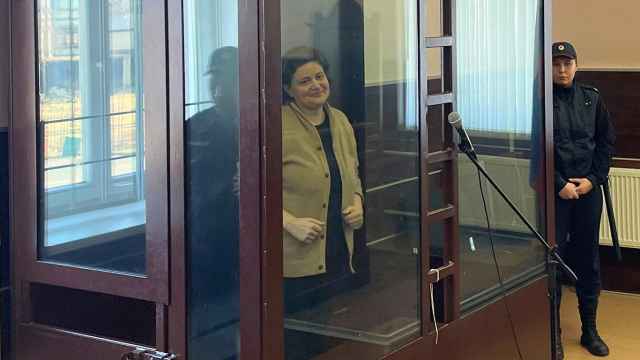Smoke breaks in stairwells, between cars on commuter trains and just about everywhere else are a common sight all over Russia, which has more smokers per capita than any other country on the planet.
But this sight is becoming rarer, as laws get tougher and cigarette advertisements and places to smoke become scarcer.
The Health and Social Development Ministry last week unveiled the first draft of the most stringent anti-tobacco legislation the country has ever seen. The proposed law will raise excise taxes on cigarettes, ban smoking on all public transportation by 2014 and eliminate smoking in cafes, bars and restaurants by 2015. Displaying cigarettes at stores and other points of sale could also be outlawed.
Since Russia ratified the World Health Organization Convention on Tobacco Control in 2008, the number of smokers has been on the decline.
The cigarette market shrank 5 percent in 2009, 4 percent last year and 2.8 percent in the first half of 2011, Interfax reported, citing British American Tobacco Russia managing director John Vanermeulen. By year-end, the market will decrease 2 percent to 3 percent.
"Over the past five years the pace of growth in the Russian tobacco market has significantly slowed down," said British American Tobacco corporate affairs director, Alexander Lyuty. "We believe that in the near future the market will continue to decline."
The annual retail volume of cigarettes sold in Russia increased more than 30 percent from 1999 to 2009. But after a record high of 393.3 billion sticks sold in 2008, the number decreased nearly 3 percent, according to a report posted on the Tobacco Free Center web site, citing Euromonitor International.
At least 100 nonsmoking cafes and restaurants opened in Moscow and other cities since 2006. Last fall, the first and only nonsmoking bar, called Belka (Squirrel) opened in Moscow.
"Nonsmoking maps" — which highlight nonsmoking restaurants, bars and cafes in several cities, including Moscow, St. Petersburg, Kazan, Tula and Cheboksary — can be found online at Takzdorovo.ru. A nonsmoking map is being developed for the northern city of Arkhangelsk.
Cigarette companies voice support for the newly proposed anti-smoking legislation but warn that excessive regulation could have adverse consequences, like smuggling and other illicit activities.
In one scenario, cigarettes would not be displayed for purchase, but buyers would have to select from a price list.
Philip Morris does not believe that cigarette displays should be outlawed.
"Display bans unnecessarily restrict competition and encourage illicit trade in tobacco products," said Philip Morris director of corporate affairs, Alexei Kim.
The smoking statistics are staggering. Nearly 40 percent of Russians, or 43.9 million people, smoke, according to research by the World Health Organization and Euromonitor International.
Smoking-related deaths numbered 500 out of every 100,000 fatalities in 2010, Euromonitor reports. Smoking contributes to the low life expectancy in the country, averaging 69 years — 61 for men and 74 for women.
More than 60 percent of all men smoke, as well as more than 20 percent of women. A quarter of all youth aged 13 to 15 smoke — 27 percent of boys and 24 percent of girls.
The number of female smokers doubled in the last 20 years, with the fastest growth rate among teenage girls.
Sales of slim cigarettes —thinner, longer and typically preferred by women and girls — went up 91 percent from 2006 to 2009 for Philip Morris, one of the biggest players on Russia's tobacco market.
British American Tobacco launched two new slim cigarette brands this year: Yava Super Slims and Alliance Super Slims.
"The superslims segment is very popular among Russian consumers. Its … share is constantly growing," said British American Tobacco corporate affairs director Alexander Lyuty.
Dmitry Yanin, an anti-tobacco activist and the head of the International Confederation of Consumer Societies Association, blames advertising. The organization has been actively trying to curb tobacco advertising for years. Last month the group saw a major victory with the ban of tobacco advertising in the metro.
Earlier this year Donskoi Tabak, the largest homegrown cigarette manufacturer of classic Soviet brands including Prima and Kosmos, had to pull ads for Kiss, its brand of slim cigarettes that come in different flavors.
The predominantly pink ads featured young smiling girls. One of their more controversial advertisements showed a girl with a lollipop in her smiling mouth. "I like everything new, tasty and round," was written in white letters under the girl's face.
The Federal Anti-Monopoly Service decided that the advertisements were inappropriate and obviously targeted minors. Earlier this month a court denied the company's request to overturn the decision.
The pink and glittery Kiss web site at one time allowed visitors as young as 11 to sign in. In addition to cigarette product information the site featured advice on how to deal with homework, parents and menstruation, Yanin said. The web site has now been upgraded to block access for those under 18.
Yanin considers the legal victory against the Kiss ads a huge step — considering that the majority share of Donskoi Tabak is owned by Kiriyaki Savvidi, wife of United Russia deputy and former Donskoi owner Ivan Savvidi.
He is optimistic that the situation can improve. "Our life expectancy could be 70, like in other underdeveloped countries of the European Union," Yanin said. "It's realistic."
A Message from The Moscow Times:
Dear readers,
We are facing unprecedented challenges. Russia's Prosecutor General's Office has designated The Moscow Times as an "undesirable" organization, criminalizing our work and putting our staff at risk of prosecution. This follows our earlier unjust labeling as a "foreign agent."
These actions are direct attempts to silence independent journalism in Russia. The authorities claim our work "discredits the decisions of the Russian leadership." We see things differently: we strive to provide accurate, unbiased reporting on Russia.
We, the journalists of The Moscow Times, refuse to be silenced. But to continue our work, we need your help.
Your support, no matter how small, makes a world of difference. If you can, please support us monthly starting from just $2. It's quick to set up, and every contribution makes a significant impact.
By supporting The Moscow Times, you're defending open, independent journalism in the face of repression. Thank you for standing with us.
Remind me later.






